President’s Welcome
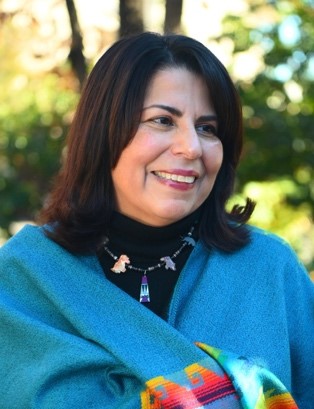
Dear students,
Welcome to San Joaquin Delta College!
On behalf of the Board of Trustees and the faculty and staff, I want to welcome all of you to San Joaquin Delta College. We are excited to have you join us in your pursuit of your higher educational goals. As a former community college student myself, I am dedicated to leading San Joaquin Delta College in our efforts to provide an inclusive, culturally relevant, high-quality education for all students. I am an equity-minded leader and anti-racist educational practices and removing systemic barriers to higher education are my top priorities. I believe in all of our students and recognize students bring a wealth of knowledge, experience, and expertise to their education. As the Superintendent, I am committed to working with the campus community and the community at large to find the best approaches to serving students and meeting local workforce training needs. Creating equitable access for all students is a crucial step in providing a stronger workforce and improved quality of life in our region. Our new Mission, Vision, and Strategic Goals tell you a lot about the District and how we will support you in your educational journey.
Mission
We actively and continuously strive to be a student-centered, anti-racist, equity-focused college that serves the educational and economic development needs of our communities. We commit ourselves to high standards of teaching and learning, provide excellent career and transfer education programs, and offer high-quality support services which empower all students to pursue personal development and achieve their academic goals.
Vision
We believe in our students and act as a catalyst for knowledge growth, social equity, economic mobility, personal development, and life-long learning.
Strategic Goal 1 - Student-Centered
Increase student success metrics for all students, especially for disproportionately impacted students, to significantly reduce equity gaps.
Strategic Goal 2 - Innovative and Inclusive
Improve operational practices to ensure access to an equity-minded, student-centered experience.
Strategic Goal 3 - Community-Focused
Initiate and promote community partnerships, increase engagement, and expand opportunities for innovation, entrepreneurship, and cultural and intellectual exchange.
This catalog will serve as a tool that you can use to locate information about academic programs, student support services, and your rights and responsibilities as a student.
Remember, we believe in you. We believe in our communities, too. We are a leader in the communities we serve, providing high quality workforce training and academic programs for thousands of students each year, preparing students to enter the workforce and earn high paying jobs or to transfer to four-year universities.
We are here to support you in your pursuit of higher education. I wish you all of the best on your journey.
Sincerely,
Dr. Lisa Aguilera Lawrenson
Superintendent/President
Board of Trustees
|

Ms. C. Jennet Stebbins
South Stockton/Weston Ranch
Area 1
|
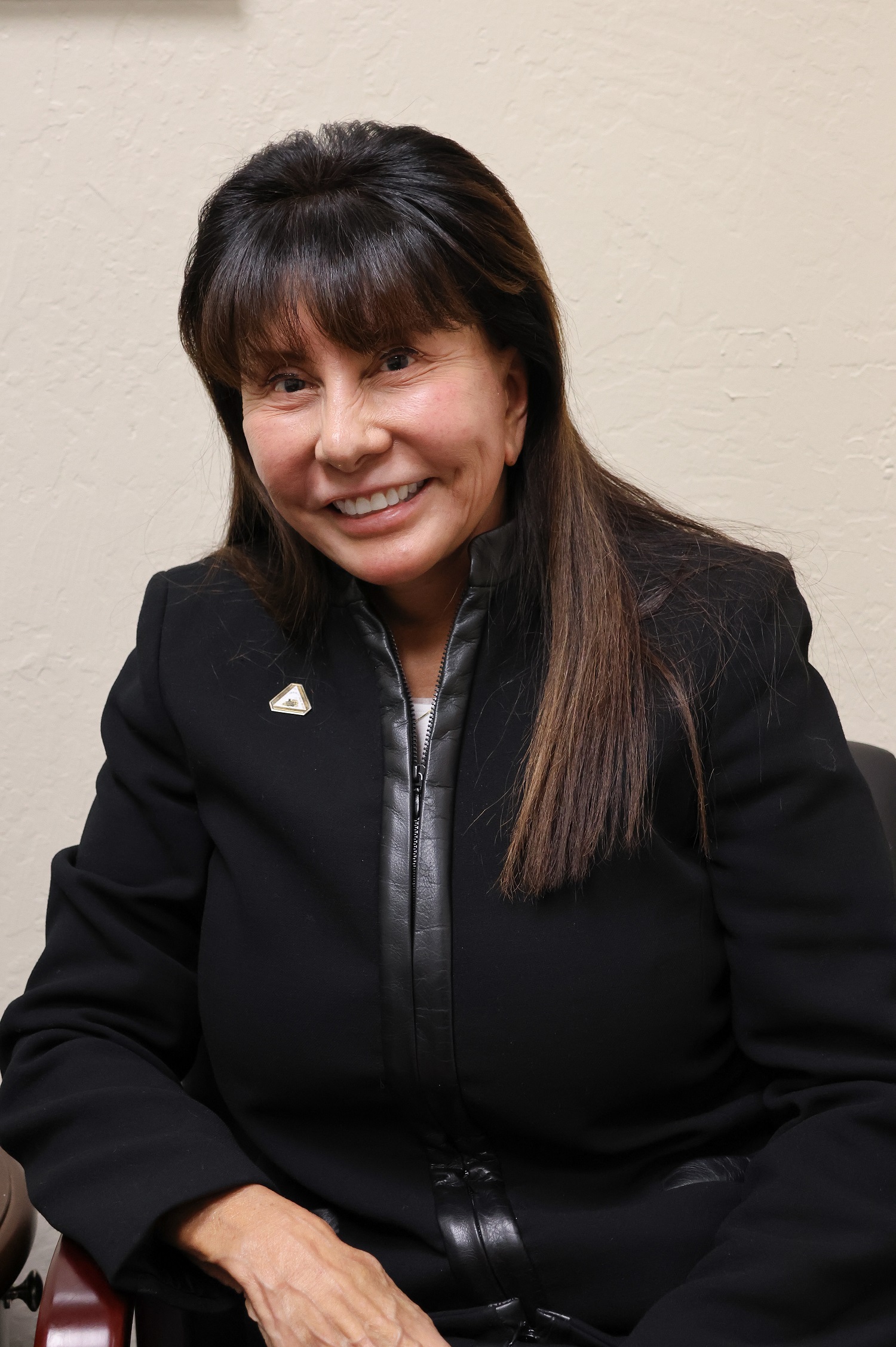
Dr. Jessie Garza-Roderick
Central Stockton
Area 2
|
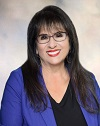
Ms. Janet Rivera
North Stockton
Area 3
|

Dr. Charles Jennings
Lodi/Galt
Area 4
|
|
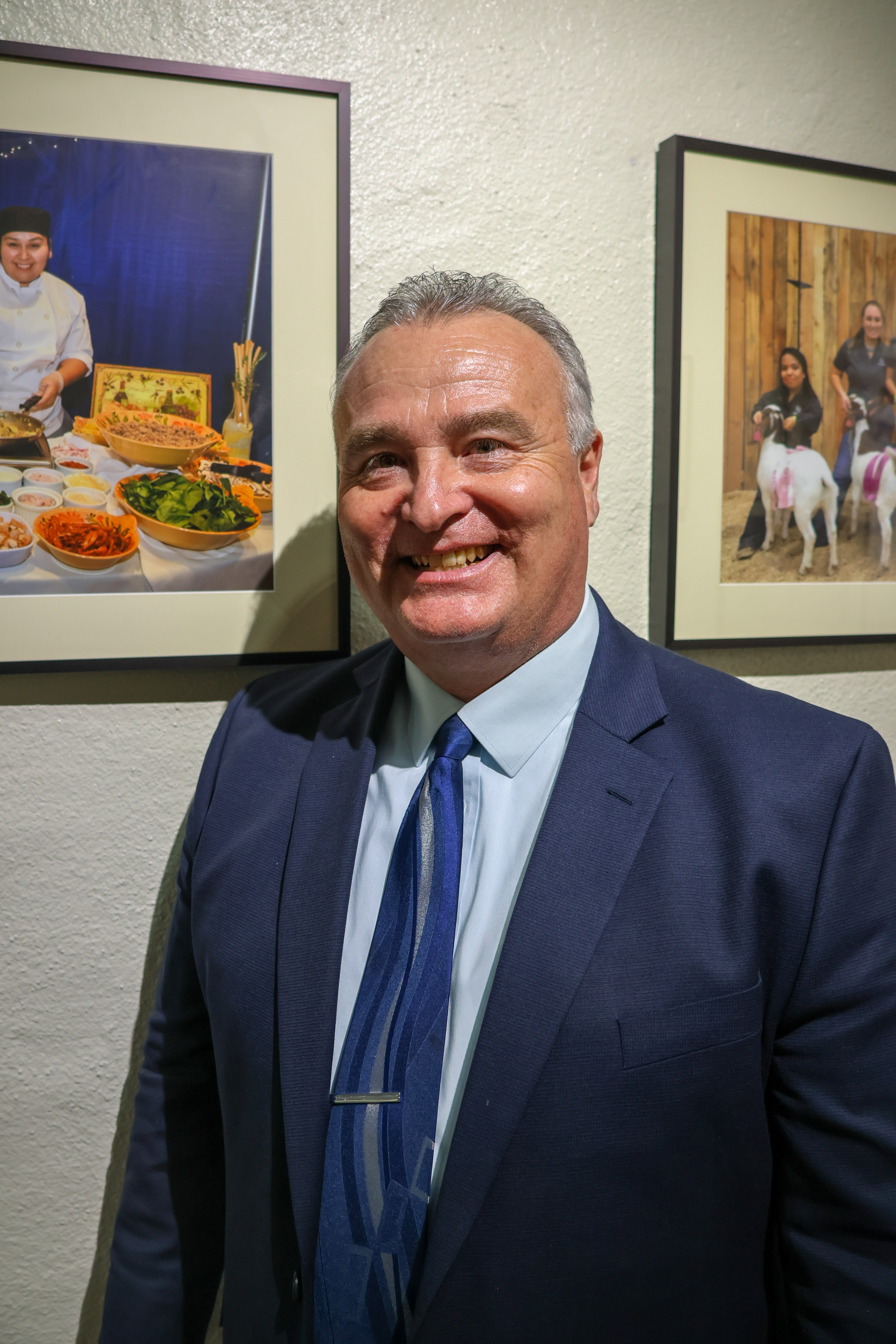
Dr. Armando Valerio
East San Joaquin/Calaveras County
Area 5
|

Ms. Valerie Stewart-Green
Tracy/Mountain House
Area 6
|

Catherine Mathis, M.D.
Lathrop/Manteca
Area 7
|
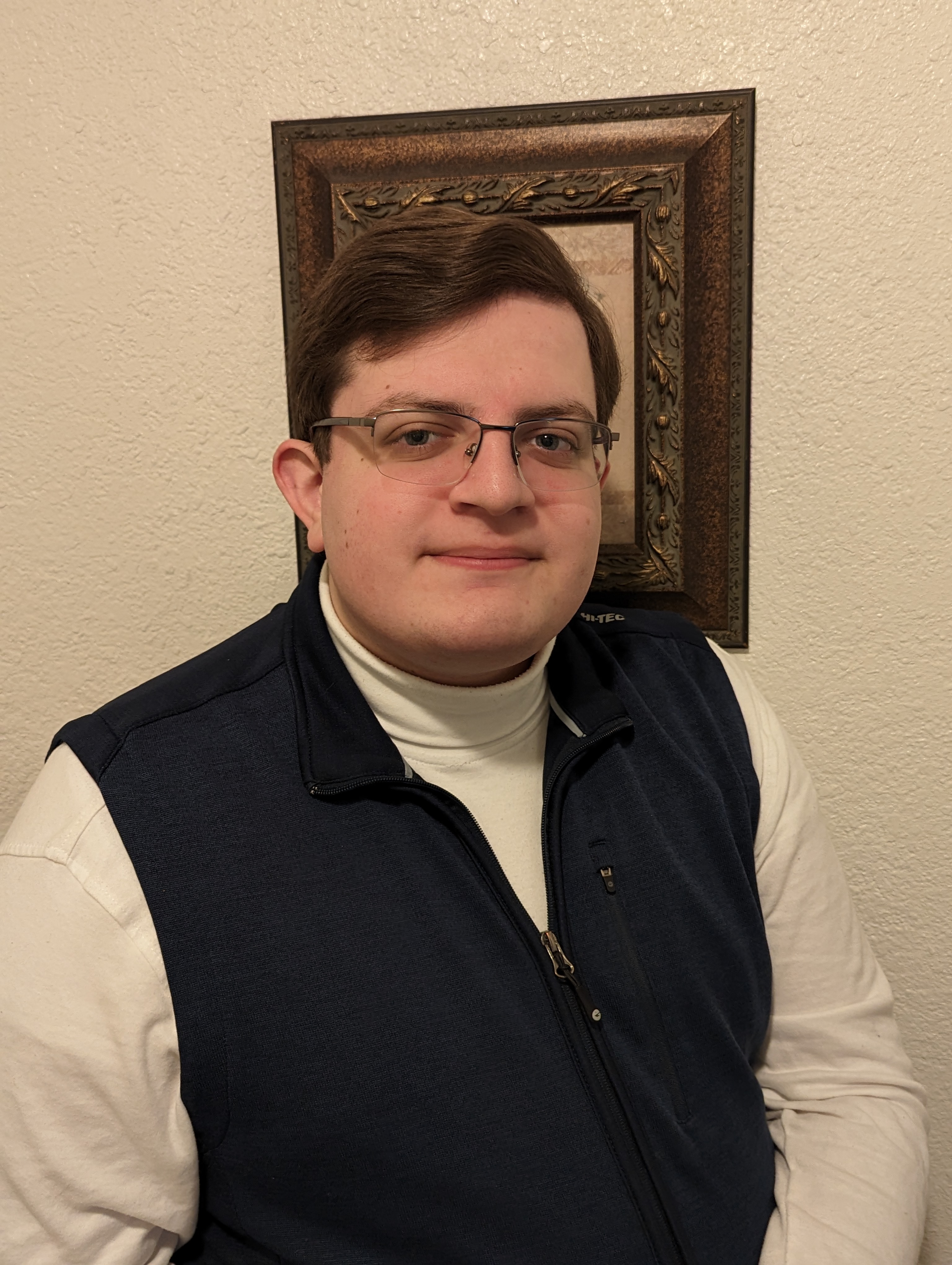
Mr. Dylan Myers
Student Representative
|
Administration
Lisa Aguilera Lawrenson, Ph.D.
Superintendent/President
Charles “Kale” Braden, Ed.D.
Assistant Superintendent/Vice President of Instruction and Planning
Lonita Cordova, Ph.D.
Assistant Superintendent/Vice President of Student Services
Augustine Chavez, M.B.A
Vice President of Administrative Services
Bradley Salters, M.S.
Vice President of Human Resources and Risk Management
Mission Statement
We actively and continuously strive to be a student-centered, anti-racist, equity-focused college that serves the educational and economic development needs of our communities. We commit ourselves to high standards of teaching and learning, provide excellent career and transfer education programs, and offer high-quality support services which empower all students to pursue personal development and achieve their academic goals. (BP 1200, 5/17/22)
Vision Statement
We believe in our students and act as a catalyst for knowledge growth, social equity, economic mobility, personal development, and life-long learning. (BP 1201, 5/17/22)
Values
Delta College is a beacon of hope for students, providing them with an innovative, student-ready, equity-minded college experience through high-quality teaching, learning, and support services. We express these values in all that we do.
| Community |
We engage with regional partners to align the college with employer and community needs, provide enrichment, and serve as a hub for innovation and entrepreneurship, as well as cultural and intellectual exchange.
|
| Inclusion and Respect |
We are a diverse educational institution that promotes academic discourse and encourages courageous conversations to address our community needs with solution-focused thinking. An inclusive culture means all communities contribute and are critical stakeholders in conversations. Diverse perspectives from all constituency groups, regardless of rank or title, are solicited and honored. We listen openly, engage respectfully, and communicate authentically and regularly.
|
| Inquiry and Innovation |
We employ data-informed, sustainable processes and are committed to continuous improvement. Flexibility and adaptability are critical in our constantly changing environment. New and emerging ideas for the betterment of the college and the student experience are celebrated. We consistently evaluate our effectiveness and adjust as necessary.
|
| Student-Centered |
We put our students’ education first, acknowledging students’ voice as central to the learning experience. Programs and offerings are designed with this in mind. We strive to listen to students’ needs, aim to be culturally responsive, and prioritize a shift in our approach to meet students where they are and help them achieve their goals.
|
| Social Justice and Equity |
We recognize that society unfairly distributes wealth, opportunity, and privilege through systems such as higher education and seeks to disrupt this inequity. Higher education should be a civil right and we see it as a means to create a more just world, recognizing that we have an obligation to examine our policies and practices to strengthen and safeguard equity, diversity, and inclusion. We are committed to providing all students with the support they need to be successful, especially students who come from historically marginalized and underserved communities.
|
| Wellness and Safety |
We prioritize and promote the well-being and safety of our college community.
|
Land Acknowledgement
We acknowledge that San Joaquin Delta College serves students and the community on the unceded ancestral homeland of indigenous peoples, including the Yokuts [yoh-kuts], Plains Mi-Wuk [mee-wuck], Patwin [PAT-win], and Nisenan [nish-n-non]. This land remains inseparable from its aboriginal stewards. As guests, we recognize that we benefit from living and working on their traditional homeland, and we wish to pay our respects by acknowledging the ancestors, elders, and relatives of the Yokuts [yoh-kuts], Plains Mi-Wuk [mee-wuck], Patwin [PAT-win], and Nisenan, including by affirming their sovereign rights as First Peoples. We remain grateful for the rich culture, languages, contributions, and heritage of the First Nation peoples who lived here and loved here, who raised their families here, who cared for land and life here, who are buried in many marked and unmarked places here, and who remain here despite acts of genocide, assimilation, and forced removal. Let us honor them, this land, and all life in our thoughts, words, and actions in this place.
Accreditation
San Joaquin Delta College is accredited by the Accrediting Commission for Community and Junior Colleges, 428 J Street, Suite 400, Sacramento, CA 95814, (415) 506-0234, an institutional accrediting body recognized by the Commission on Recognition of Postsecondary Accreditation and the U.S. Department of Education. The District has three educational centers recognized by the Commission to offer 50% or more of a degree or certificate program: the Stockton Campus at 5151 Pacific Avenue, Stockton, CA 95207; the Manteca Center at 5298 Brunswick Road, Manteca, CA 95336; and the South Campus at Mountain House, 2073 South Central Parkway, Mountain House, CA 95391.
The College’s programs are fully accredited or approved by professional organizations and/or national and state agencies including:
- Accrediting Commission for Education in Nursing
- California Commission on Peace Officers Standards and Training
- California State Board of Registered Nursing
- California State Board of Vocational Nursing and Psychiatric Technicians
- California State Department of Education
- California State University
- National Automotive Technician’s Education Foundation
- University of California
Student Learning Outcomes
San Joaquin Delta College Philosophy on Student Learning Outcomes
The purpose of Student Learning Outcomes and Assessment (SLOA) is to improve student learning. It is driven by the District’s mission and is a professional responsibility of faculty, staff, managers, and administrators. Outcomes and assessments are primarily developed and implemented by faculty and student service professionals. SLOA requires the institution to provide clear and measurable outcomes, authentic learning experiences, and assessment of student learning that includes the systematic collection, collaborative analysis and interpretation, and use of assessment information to understand and improve teaching and learning.
Student Learning Outcomes for all programs and courses are published on the college website: www.deltacollege.edu/department/student-learning-outcomes-and-assessment.
Institutional Learning Outcomes
San Joaquin Delta College is committed to providing students with the knowledge and skills necessary to succeed as productive members of society. Degree and certificate programs are designed to foster the development of students who demonstrate and apply the principles listed below.
- HUMAN CULTURE AND THE PHYSICAL WORLD
- Awareness and Appreciation of Social Institutions
- Understand the growth and evolution of social, political, economic, religious, and cultural systems.
- Recognize the essential nature of the arts in affecting thriving cultures.
- Appreciate the primary significance of cultural diversity as a factor in the formation and success of society.
- Environmental Responsibility
- Understand how to use resources responsibly.
- Understand why human population growth is an important environmental issue.
- Understand how natural processes and human activities contribute to climate change.
- DISCIPLINE, CAREER, AND TECHNICAL COMPETENCE
- Discipline-specific Knowledge
- Develop knowledge of a discipline, set of related disciplines, or a career/technical field.
- Application and Analysis of Knowledge
- Apply, analyze, synthesize, and evaluate concepts, principles, and practices in a variety of real-world settings.
- QUANTITATIVE, SCIENTIFIC, AND COMMUNICATION SKILLS
- Quantitative Competency
- Apply mathematical concepts and principles in a variety of real-world contexts.
- Demonstrate knowledge of fundamentals of 21st century economic, business, and personal financial concepts, principles, and processes and effectively apply it in real-world settings.
- Scientific Competency
- Demonstrate knowledge of fundamental scientific principles, concepts, and processes (e.g., scientific method), and effectively apply it in real-world settings.
- Communication Competency
- Demonstrate effective and appropriate methods of communication (e.g., reading, writing, listening, speaking, singing, performing and visual arts, and utilizing electronic media).
- PERSONAL AND SOCIAL DEVELOPMENT
Development and Demonstration of Responsibility: Personal; Civic and Social; Interpersonal and Intercultural
- Personal Responsibility
- Set and achieve personal, educational, and life goals.
- Manage the college experience to achieve academic and personal success.
- Prioritize family, work, and leisure effectively.
- Develop economic self-sufficiency.
- Demonstrate responsibility for one’s own health, safety, and well-being.
- Civic and Social Responsibility
- Demonstrate a commitment to public life through engagement in organizations.
- Exercise leadership and appropriate behavior as a member of groups.
- Practice ethical behavior through appropriate choices.
- Interpersonal and Intercultural Responsibility
- Act with civility and respect for people of diverse cultures, socioeconomic and political backgrounds, sexual orientations, disabilities, ideas, and viewpoints.
- Engage in meaningful relationships with peers, instructors, and others.
- Demonstrate cooperation and collaboration with others in academic, artistic, athletic, and other settings.
- LIFELONG LEARNING
- Information and Technological Competency
- Find, evaluate, ethically use, and appropriately cite information in a variety of formats (e.g., print, multimedia, and electronic resources).
- Intellectual Competency
- Think, reason, and reflect critically; generate questions and explore ideas; and analyze and synthesize information.
- Engagement in Lifelong Learning
- Update knowledge and skills to maintain currency in a discipline(s) or a career/technical field.
- Engage in learning for intellectual stimulation and recreational activities.
Delta College Foundation
The Delta College Foundation collaborates with San Joaquin Delta College by cultivating relationships, building partnerships, and developing vital resources and funds that promote equitable access to higher education. The Foundation embraces community collaboration and camaraderie to inspire educational success by supporting and enriching experiences for all students. Delta College depends on the generosity of donors to establish scholarships, support student assistance programs, and enhance regular academic programs. As a tax-exempt, non-profit corporation under IRS Code 501(c)3, the Foundation accepts donations including cash, real estate, stocks, bonds, mutual funds, life insurance policies, and develops planned giving opportunities. For more information, visit the Delta College Foundation web page.
College Overview
San Joaquin Delta College (SJDC) is a single college district at the northern end of the San Joaquin Valley, with its main campus 46 miles south of Sacramento and 85 miles east of San Francisco. SJDC serves approximately 2,300 square miles and portions of five counties, including San Joaquin, Calaveras, Sacramento, Alameda, and Solano. The City of Stockton is the most populated city in San Joaquin County and the 13th largest city in California (US Census 2010). Stockton is one of the most diverse cities in the nation [niche.com/US CENSUS], with a population that is approximately 40 percent Hispanic/Latinx, 20 percent white, 20 percent Asian, 12 percent Black/African American, and 8 percent Pacific Islander, Native American, or other races. SJDC is recognized as a Hispanic Serving Institution (HSI) and an Asian American Pacific Islander Serving Institution (AANAPISI).
Established in 1935, SJDC began as Stockton Junior College, a private lower-division program of College of the Pacific, with an initial enrollment of 73 students. The goal was to admit students who were not fully qualified for regular admission to Pacific, and the experiment was a success. In 1948, Stockton Junior College became Stockton College with a total student body of just under 2,000. At that time, all freshman and sophomore classes were moved to a 43-acre site south of Pacific’s campus. The physical separation of Stockton College and College of the Pacific was followed in 1951 by the recommencement of lower-division class offerings at Pacific. During the 1950s, as the educational needs of the region became paramount, Stockton College expanded its vocational programs and in 1963 legally separated from Stockton Unified School District and became San Joaquin Delta College.
After this separation, a new main campus was soon established about two miles north of the College’s original home. The College continued to grow and by 1976 was serving an area larger than the states of Delaware or Rhode Island. With the passage of time came a need to build new facilities and upgrade existing ones, and voters made this possible by approving a $250 million bond initiative in 2004. The bond led to high-profile improvements including the renovation of Goleman Library, construction of the Lawrence and Alma DeRicco Student Services Building, and the development of the new state-of-the-art Science and Math Building.
Work in other areas has continued since 2014, with the renovation of outdoor athletic facilities, the rededication of the Hazel Hill Child Development Center (originally established in 1994), and expansion of the Shima Building to house diesel and heavy equipment shops. The College plans to continue this growth to meet the needs of the students and the community at large. SJDC now serves over 23,000 students annually.
The College offers 26 associate degrees for transfer (ADTs), 66 associate degrees (AA/AS), 130 certificates, and various transfer pathways. In the interest of strengthening the economic development of our community, the College provides programs that support local industry labor market demand (e.g., health care and social assistance). SJDC collaborates with 14 community colleges and, workforce and economic development organizations through the Central Valley/Mother Lode Regional Consortium in order to support regional economic growth. By further developing its training and educational programs, SJDC strives to meet the needs of regional business and industries.
Overall, the College is proud to be an economic driver in the northern San Joaquin Valley and Delta, a region that launched California into world prominence and continues to serve the nation and the state in both agriculture and industry. SJDC’s annual economic impact on the community is an estimated $572 million, with the College supporting thousands of jobs across the region. In 2019, recognizing both the quality and value of the College, personal finance website WalletHub ranked SJDC as the top community college in California and the fourth best in the nation [Press Release].
The College has three established locations:
|
Main Campus
5151 Pacific Avenue
Stockton, CA 95207
|
South Campus at Mountain House
2073 S. Central Parkway
Mountain House, CA 95391
|
Manteca Center
5298 Brunswick Road
Manteca, CA 95336
|
|